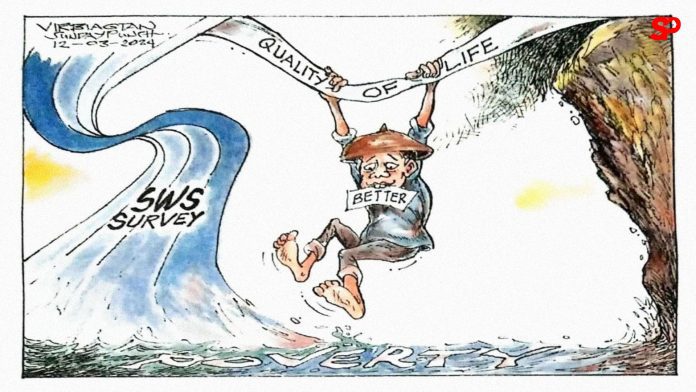Illustration by: Virgilio Biagtan
The recent Social Weather Stations (SWS) survey, conducted in September 2024, reveals that 47 percent of Filipinos believe their quality of life has improved compared to a year ago, a figure nearly unchanged from the 46 percent reported in June. While this statistic might initially seem like a cause for optimism, it warrants deeper scrutiny to understand its implications for the broader socio-economic landscape.
The survey highlights two other critical data points: 32 percent of respondents reported no change in their quality of life, while 21 percent felt it had worsened. These numbers reflect a lingering divide in the country’s recovery from economic challenges, including inflation, job insecurity, and the enduring impacts of the pandemic. While almost half of Filipinos see progress, nearly the same proportion remain stagnant or perceive their situation as deteriorating. This raises the question: Are current efforts to uplift the populace reaching everyone equitably?
The government’s initiatives to curb inflation and provide social safety nets have likely played a role in the perceived improvements. However, the uneven distribution of gains across different socio-economic groups highlights the structural inequalities that persist. For instance, while middle-class Filipinos may experience some relief from government policies like fuel subsidies or wage hikes, lower-income groups often grapple with the rising cost of basic commodities. These disparities may explain why a significant portion of the population does not feel a noticeable improvement in their quality of life.
Moreover, the 21 percent who feel worse off serve as a stark reminder that progress remains fragile. Factors such as job instability, health care access, and regional disparities exacerbate their struggles. The survey underscores the importance of prioritizing targeted interventions, particularly for vulnerable communities, to ensure inclusive development.
Policymakers must also consider the psychological dimension of these findings. The perception of improvement or decline often depends not only on tangible economic indicators but also on people’s outlook for the future. While macroeconomic data may paint a positive picture, it is crucial to address the anxiety many Filipinos feel about rising debt, uncertain employment prospects, and the affordability of education and healthcare.
For a more comprehensive improvement in quality of life, a multi-pronged approach is essential. Beyond economic growth, there must be investments in education, healthcare, and infrastructure to reduce disparities and create sustainable opportunities for all. Strengthening social support systems and fostering economic resilience at the grassroots level will ensure that progress is not just felt by a select few but by every Filipino.
The SWS survey is a valuable tool for assessing national sentiment, but it is also a call to action. It reminds us that while progress has been made, much work remains to create a society where every Filipino can confidently say their quality of life has genuinely improved. As we move forward, let us hope for policies and programs that prioritize equity, inclusivity, and long-term sustainability, ensuring that no one is left behind in the journey toward a better future.

